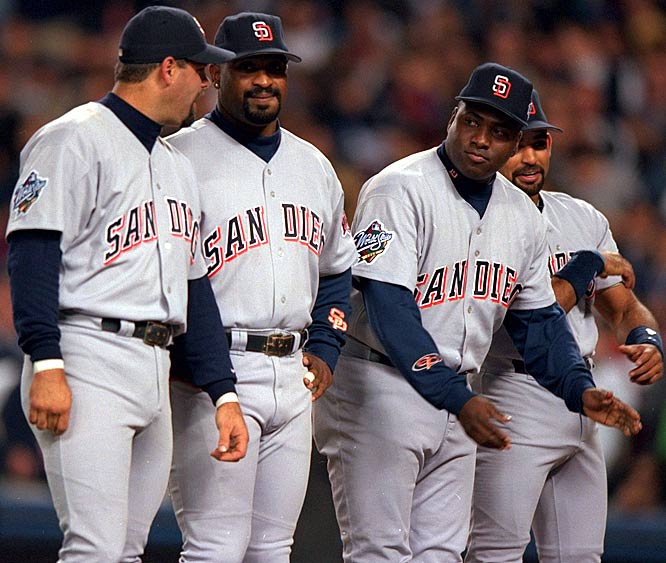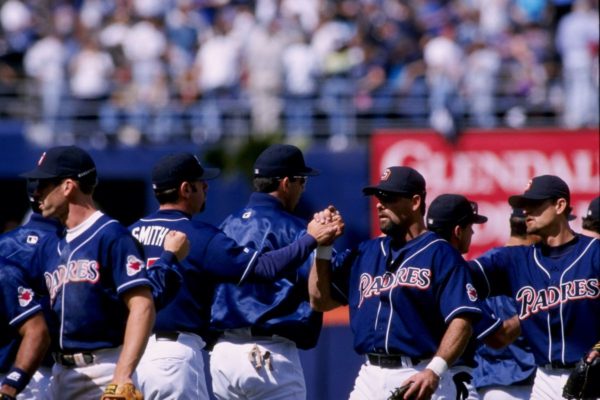The 1984 Padres vs. the 1998 Padres- who would win?

Credit: Sporting News

Game 4
1984 looks across the diamond and sees the ace of the ’98 squad, Kevin Brown warming up to make his second start of the series as they go for the throat. Tim Lollar is slated to go for 1984, hoping to save Eric Show for a decisive Game 5.
Once again, it was the Kevin Brown Show. He is not as dominant as his first start but is good enough to put the team in a position to win. He had a brief hiccup, allowing a solo home run to Graig Nettles, but he settles down and retires a dozen in a row.
On the flip side, Lollar gives a valiant effort. After posting 1.4 WAR during the regular season, he rises to the occasion and pitches six innings, allowing just one run, a pinch-hit solo home run to Jim Leyritz.
The game is tied 1-1 after six, with both starters tossing quality games. 1984 chooses to go to the bullpen to start the seventh, going with Craig Lefferts, a reliable southpaw who appeared in at least 60 games for three straight years in San Diego.
The former Arizona Wildcat turns in a perfect seventh, but the 1984 lineup must face Brown to start the bottom half. After a strikeout and a walk, Brown is pulled in favor of Donne Wall, a right-hander who had a stingy 2.43 ERA during the season. Garry Templeton singles, putting runners on first and third in a tie game, a big jam for Wall.
With the pitcher’s spot due up, 1984 calls on Kurt Bevacqua to pinch-hit. The 37-year-old Florida native is accustomed to these situations, as he totaled 376 career pinch-hit appearances over his career and did so 36 times in 1984 alone. He gets the job done, as he hits a long fly ball, caught by Finley out in center field, but enough to score the run on a sac fly, giving 1984 a 2-1 lead in the bottom of the seventh. Wall then retires the next hitter to end the inning.
The two teams exchange scoreless frames heading into the ninth. Three outs separate 1984 from once again knotting up the series, and they have their All-Star closer Gossage back on the bump.
However, Gossage must face the meat of 1998’s order, starting with Ken Caminiti, who doubles off of the wall, setting up a tense ninth inning. Vaughn hits a long fly ball to move him over to third before Joyner returns the favor and hits a sacrifice fly to tie the game, ending the save opportunity for Goose.
Gossage gets out of it without further damage, but the lineup is unable to capitalize in the bottom of the ninth.
To extras, we go.
Pitching in the top of the 10th is Dave Dravecky, who was a reliable arm in 1984, with a 2.93 ERA and 123 ERA+ in 50 games. He is met by Steve Finley, who singles to lead off. Tony Gwynn does what he does best, and shoots a single through the “5.5 hole” between shortstop and third base. With first and second, no one out, 1984 is in a real tight spot. Dravecky leaves a pitch up for Caminiti, who is batting right-handed against the lefty. He smashes it over the left-field fence for a crushing three-run home run.
Hoffman once again nails it down in the bottom of the 10th, sealing the save and the win. 1998 has taken control of the series.
Final: 1998 (5), 1984 (2)
1998 leads 3-1
Game 5
Luckily for 1984, they saved Eric Show for this critical game and avoided having to have him go toe-to-toe with Brown. 1998 is in clear control of the series, but future Hall of Fame 1984 manager Dick Williams feels good about their chances with Show on the hill.
1998 counters with Joey Hamilton, giving Ashby an extra day of rest, allowing him to be ready for a possible Game 6 while Brown can be well-rested for a pivotal Game 7 if necessary.
1984 can take control of the game early, thanks to a two-run home run by Carmelo Martinez. Alan Wiggins wreaks havoc on the base paths once more and scores on a Tim Flannery single.
With a 3-0 lead early, Show can relax and navigate through 1998’s loaded lineup with minimal damage. Shortstop Chris Gomez got the lone run off of Show with an RBI double in the fifth.

1984 blew it open in the sixth inning when Tony Gwynn singled home a run and scored himself when McReynolds slugged another home run, making the score 6-1.
Andy Hawkins took the ball in the seventh and ended up finishing the game’s final three innings, allowing just one run, an RBI single by Steve Finley, scoring pinch-hitter Mark Sweeney.
1984 lives to see another day.
1984 (6), 1998 (2)
1998 leads 3-2
Game 6
With 1998 being the home team, they are hoping to clinch the series and avoid the unpredictable nature of a Game 7. They turn to Ashby to close it out. 1984 goes back to Thurmond, each making their second start of the series.
With 1984 playing for their lives, they come out swinging. Alan Wiggins gets on base ahead of a Tony Gwynn double, where Wiggins scores, giving 1984 the early lead.
After some early trouble, Ashby settles down and stops the bleeding at two runs. While 1998’s lineup goes to work on Thurmond. The trio of hitters in Gwynn, Vaughn, and Caminiti is one of the best triplets in any lineup in Padres history. They do some damage against Thurmond. Gwynn (1998 version) leads off the fourth working the count full before lining a base hit into center field. Thurmond gets Vaughn to fly out to the warning track, keeping a hobbled and slowed Gwynn at first. Caminiti comes up with a chance to tie the game with an extra-base hit.
Caminiti relishes these opportunities and lines a double between McReynolds and Martinez in left-center, scoring Gwynn and tying the game.
The damage does not end there as Joyner lined a base hit into right field, scoring Caminiti and giving 1998 a 2-1 lead.
1984 answers in the top of the sixth with a solo home run by Steve Garvey, tying the game back up at 2-2.
It is a battle of the bullpens, with 1984 throwing out Lefferts, Dravecky, and 1998 countering with Miceli and Mark Langston. In the bottom of the eighth, 1998 seized the opportunity to take the lead. Dravecky walked pinch-hitter Ruben Rivera to lead off the inning. Veras bunted him over to second to set up a key at-bat from Finley. Finley singles sharply to the 1984 version of Gwynn in right field, however, it was too sharp to score Rivera. With runners on first and third, 1998’s Gwynn comes up to the plate with a big chance.
Gwynn hit a career .401 when hitting with runners and first and third, thus, as expected, Gwynn comes through. He lines a single into right field, scoring Rivera and giving 1998 a 3-2 lead.
Feeling the game slip away, 1984 opts to put in closer Rich Gossage to stop the bleeding with runners on first and second and one out with the big sluggers coming up. Gossage disposes of Vaughn and walks Caminiti, loading the bases for Joyner.
Joyner lined a single into center field, scoring another run and putting 1998 up 4-2.
Dagger.
However, the game isn’t over as the top of the ninth starts, but not before some Hell’s Bells toll and fire is ignited, signaling the entrance of Trevor Hoffman to seal the game and the series win.

Down by two, 1984 starts with the bottom of the lineup in Garry Templeton. After a courageous battle, Hoffman strikes out the 28-year-old Santa Ana native with a changeup in the dirt.
Pinch-hitter Luis Salazar steps to the plate to face the would-be Hall of Famer. Hoffman takes care of business once again, getting Salazar to ground out to Gomez at short.
Down to their last out and trailing by two runs, 1984 turns to Alan Wiggins at the top of the lineup. Wiggins excelled at working walks, with a 10.8 percent walk rate in 1984. He does so one last time in this series, getting on base to give 1984’s Gwynn a chance to spark the comeback.
It’s Gwynn versus Hoffman, 19 against 51, the two faces of the San Diego Padres franchise. Gwynn is representing the tying run.
The saying goes that good pitching beats good hitting. What about Hall of Fame pitching against Hall of Fame hitting? It’s an epic battle. Full count. Several foul balls. The crowd at Jack Murphy on their feet, waving white towels. Palm trees peering over the navy fence with orange trim, perhaps awaiting a game-tying homer from Mr. Padre.
The at-bat approaches its 10th pitch. Gwynn lines a single through the 5.5 hole off of number 51, putting the go-ahead run at the plate in the form of Graig Nettles.
Nettles is undoubtedly capable, having hit 20 home runs during the year, having exceeded 350 for his career (he would finish with 390). Given he is pushing 40 years old, he’s not as he once was with the Yankees, where he hit 37 bombs in 1977.
Tired and fatigued, Nettles steps into the box against the equally perspiring Hoffman. Again, it’s a battle. With the count 2-2, Hoffman unleashes yet another one of his deadly changeups. Like the light bulb at the end of an angler fish’s probe, the prey cannot resist the changeup.
Nettles bites, and misses, game and series over. 1998 wins.
Final: 1998 (4), 1984 (2)
1998 wins 4-2
Series MVP: Ken Caminiti
Native of Escondido, CA. Lived in San Diego area for 20 years. Padres fan since childhood (mid-90s). I have been writing since 2014. I currently live near Seattle, WA and am married to a Seattle sports girl. I wore #19 on my high school baseball team for Tony Gwynn. I am a stats and sports history nerd. I attended BYU on the Idaho campus. I also love Star Wars.
You may be too young to remember it, but Tempy hit a double from each side of the plate in the seventh game to give the crown to 1984! Ah, memories